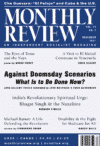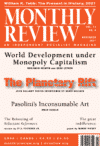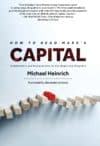Marxism

Eleanor Burke Leacock taught that transhistorical, universal male dominance is a myth, not a fact. Writing during the grimmest period of Cold War reaction, Leacock put forward a critique of the mainstream U.S. ideology, which took for granted the idea that there were only two genders, in binary opposition to each other, and that these were the direct product of so-called male and female nature. | more…

Across the humanities and the social sciences, critical attention is being given to the nonhuman as an ecological, philosophical, and political problem—the nonhuman here meaning anything from animals and plants to manufactured objects. Going under names as various as new materialism, political ecology, and object-oriented ontology, these studies comprise a movement that is largely described as the nonhuman turn. | more…

With the rapidly worsening capitalist demolition of the planetary environment and the expansion of ecosocialist movements in response, leading establishment think tanks, like the corporate-supported Breakthrough Institute, dedicated to promoting the ideology of “green capitalism” at any cost, have found themselves in a difficult place. | more…

We should avoid offering a fatalistic worldview. In fact, the environmental movement in general and ecosocialism in particular are all about combating the current trend toward ecological destruction. Climate change is now “code red for humanity.” This is not a doomsday forecast but a call to action. | more…

El Maizal’s flag-waving communards are rapidly breaking down skepticism about the viability of leader Ángel Prado’s election campaign, for it is undeniable that they are among the reddest elements in the so-called Pink Tide. | more…

There is an urgent need to transcend the deep chasm in historical materialism, extending back to the 1920s, between the Western Marxist philosophical tradition and the Marxism of the Second and Third Internationals. This division has been closely associated with so-called Western MarxismÕs rejection of the dialectics of nature. | more…

The widespread view on the left that Marx had adopted an extreme productivist view of the human domination of nature—and hence had failed to perceive the natural limits to production and ecological contradictions in general, giving them at most only marginal attention—was contradicted by his theory of the metabolic rift. | more…

As the internationalization of monopoly capital grows, particularly through the domination of global value chains, the worldwide rate of exploitation and degree of monopoly increase as well. | more…

The job of socialists is to engage with public policy from a class perspective, informed by a Marxist understanding of contemporary capitalism—not to reform it, but to abolish it. | more…

In India, today, we are witness to the quiet rise of the figure of Mahar Sidnak, iconized and lionized as a warrior of the oppressed from the early nineteenth century. This is electrifying the anticaste struggle and energizing the militant youth, a source of inspiration as historical as it is mythical. Are material issues, or “real struggle,” really so opposed to the question of the “mythical past”? | more…

In order to commit murder or mayhem under this program, vouchers must be submitted within one week prior to the actions contemplated or within a month afterward. Persons who commit violent acts without valid vouchers will be asked to enter into Voluntary Consent Agreements to desist from unauthorized murder or mayhem, and up to one tenth of any ill-gotten gains will be donated voluntarily to the charity of their choice, without any implication of admission of guilt. | more…

With the recent revival of Karl Marx’s theory, a general interest in reading Capital has also increased. But Capital—Marx’s foundational nineteenth-century work on political economy—is by no means considered an easily understood text. Central concepts, such as abstract labor, the value-form, or the fetishism of commodities, can seem opaque to us as first-time readers, and the prospect of comprehending Marx’s thought can be truly daunting. Until, that is, we pick up Michael Heinrich’s How to Read Marx’s Capital. | more…











